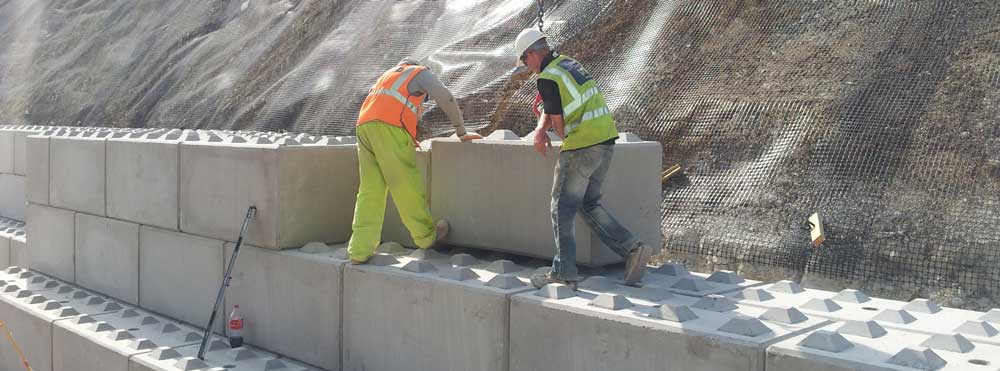For many years the options for engineers specifying retaining wall structures have been limited to time consuming and often expensive solutions such as gabion baskets or crib-wall systems. However, over the last few years more and more retaining wall projects are being completed in record times and below forecast costs by choosing interlocking blocks.
Interlocking concrete ‘’lego’’ style blocks (provided they are cast in accordance with BS EN 15258:2008) have a number of advantages over more traditional systems –
-
Speed
Retaining wall projects are often time critical – not only for cost reasons but also for reasons of safety in that open excavations are relatively unstable and liable to collapse. Similarly retaining wall structures are often required to repair land slips and of course in these cases every day taken to complete the repair can cost huge sums of money. Interlocking blocks are incredibly quick to install (often over 100m2 per day is achieved) and moreover, the method of installing the blocks means that personnel are not exposed to the risk of being trapped by embankment failure.
-
Cost
Quick installation (see above) is by its nature a relatively low cost approach. However the interlocking elements themselves are usually cheaper than alternative materials because they are mass produced in standard sizes. Direct cost comparisons have shown that interlocking block solutions are on average 75% of the cost of more traditional systems.
-
Availability
Modular block systems are mass produced in large numbers for a huge variety of project types. They are therefore always available directly off-the shelf enabling large projects to be completed extremely quickly – avoiding long lead time or waiting for a cast in-situ solution to cure.
-
Flexibility
Interlocking concrete blocks offer great flexibility in terms of the finish that can be achieved. Whilst many clients choose the standard smooth concrete finish – the blocks can easily be clad in brick, natural block / stone or rendered, according to the requirements of the local planning or conservation officer.








